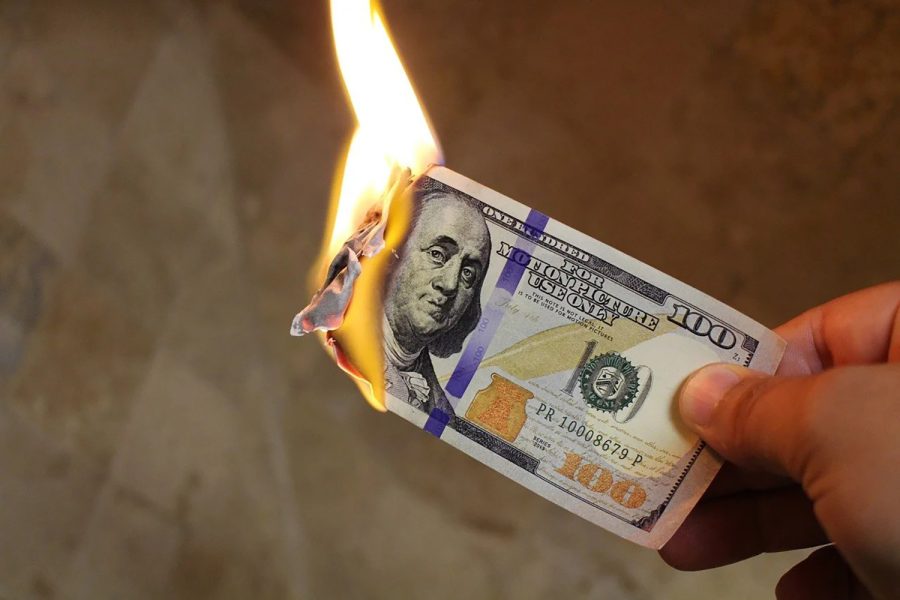COVID-19 has accelerated the world’s economy going digital, per McKinsey. During 2020, cash was used for only 17% of payments in the U.K., down from 52% in 2019, according to UK Finance. Furthermore, nearly a third of the U.K. population had mobile payments established on their phone in 2020, a 15% increase from 2019, per UK Finance.
Since the pandemic began, the world has been exposed to a cashless society. 84.8% of the High School has used cash less frequently since the pandemic began, according to a survey conducted by The Standard March 10-11 with 184 respondents involving students and faculty.
Rion Emery (’25) said she switched to digital payment for convenience and health reasons due to the pandemic.
“Since the pandemic started, I have just used contactless payments when buying things from a store,” she said. “It’s much easier to simply pay through your phone rather than carrying money. It is also safer to utilize contactless transactions to reduce the transmission of COVID.”
Emery’s transition is reflected among the British public. In March 2020, the first month of the pandemic, the limit on contactless payments was raised from £30 to £45 by British Retail Consortium’s head of payments policy Andrew Cagan to promote contactless payment, per The Guardian.
According to UK Finance, 83% of the U.K. population completed transactions through contactless systems in 2021. Currently, the contactless limit is £100, raised by Chancellor of the Exchequer Rishi Sunak March 3, 2021, according to Sky News. The raising of the contactless limit was established to help recover the U.K. economy.
Psychologically, spending one dollar on a credit card is equivalent to 50 cents in physical money, per BBC. In most cases, people will spend double the amount of money on a credit card than they are willing to pay with physical money.
Aris Perrotis (’25) said he does not typically use physical money, but when he does, he is more mindful of his spending.
“If I do have cash on me, I’m much more conservative with how much I spend,” Perrotis said. “Whereas when I’m with a phone, it’s easier for you to spend because you don’t actually realize or feel the money leaving from your pocket and going into somebody else’s.”
You don’t actually realize or feel the money leaving from your pocket and going into somebody else’s.
— Aris Perrotis (’25)
Similar to Perrotis, 59.6% of 184 respondents to a survey conducted by The Standard March 10-11 said they are more mindful of their spending habits when carrying physical money instead of credit cards, debit cards or mobile payment systems.
However, a cashless society disadvantages economically-developing nations as fewer citizens of developing nations have access to banks. Social Studies Teacher Travis Schill, who teaches AP Economics, said it is too early to switch to a digital currency in developing countries since many significantly rely on physical money, not banks.
“When Modi became Prime Minister of India, back in 2014, a transition away from cash towards a digital currency for digital transactions became a policy,” he said.
Schill added that nearly half of the Indian population was cash-based, disallowing access to banking, making the policy detrimental for many.
According to WorldBank, 69% of adults globally have access to a bank. However, that percentage is formed of 94% of people in wealthier countries who have access to banks, while only 63% do in developing countries. Without access to banks, consumers are unable to use credit cards and mobile payment systems.
Perrotis said crime relating to theft of physical money would likely decrease if the world goes cashless.
“Nobody carrying cash would significantly diminish crime rates since there is no physical money to steal,” he said. “If someone steals your credit or debit card, it is very easy to lock them immediately. In addition, if your smartphone is stolen, the thief would need to use Face ID or touch ID which is extremely secure.”
Considering whether the world is imminently approaching a cashless society, Schill said cash will be progressively eliminated, and it may become a symbol of status.
“It seems to be the natural trajectory that cash will be gradually phased out in the next few decades,” he said. “But as with all transitions, I suspect there will be a kind of a fashion for cash as well. In which the way that record players and hand tools and traditional ways of doing things often become fashionable.”
In addition, Schill said society in the future may even deem cash as a symbol of socioeconomic.
“I could actually see the use of cash becoming a socioeconomic status symbol”, he said. “Upper middle class young professionals could be the ones who use cash to pretend they live in the 20th century.”






